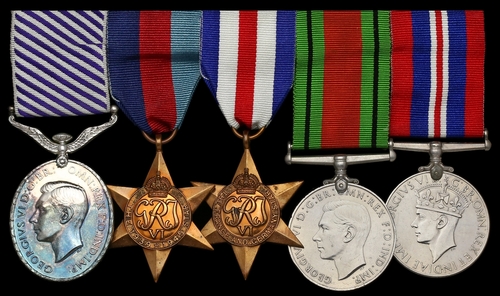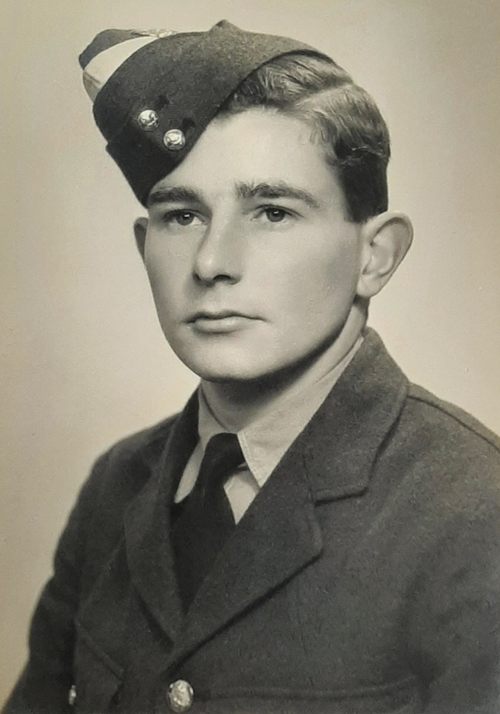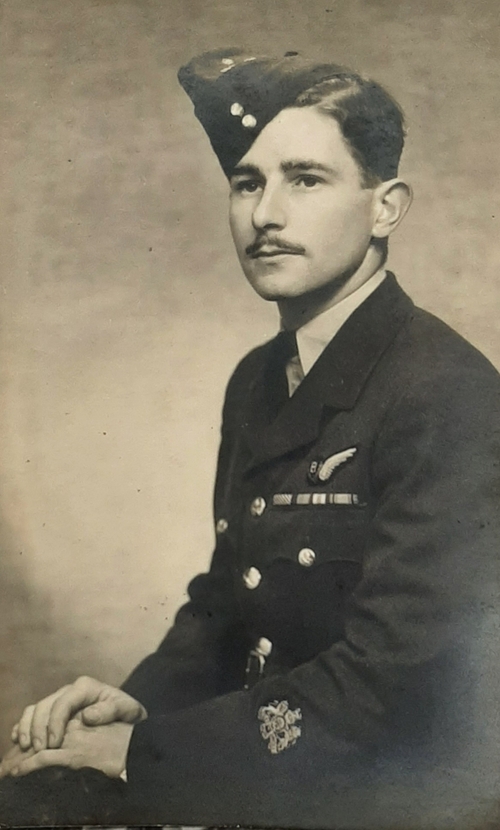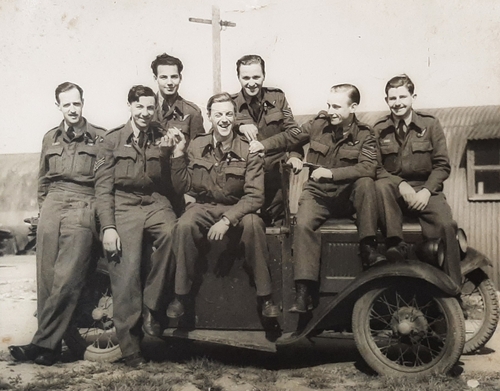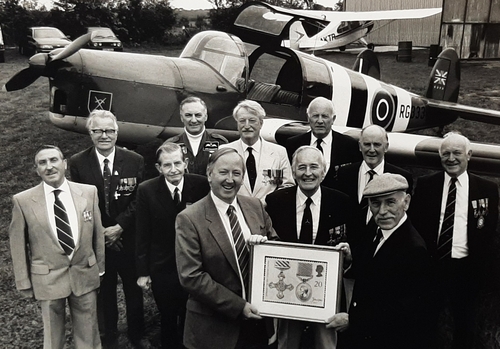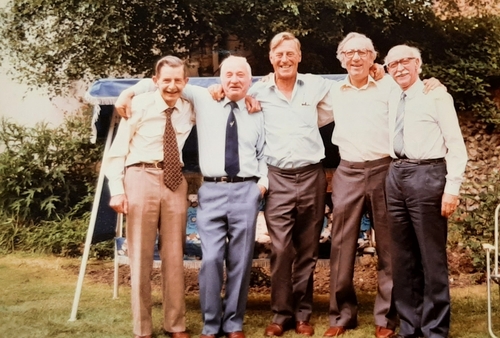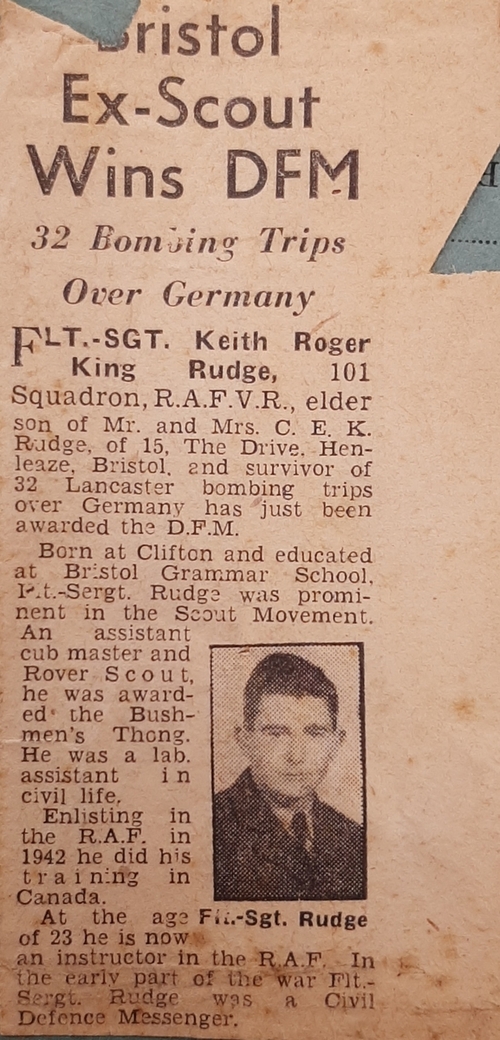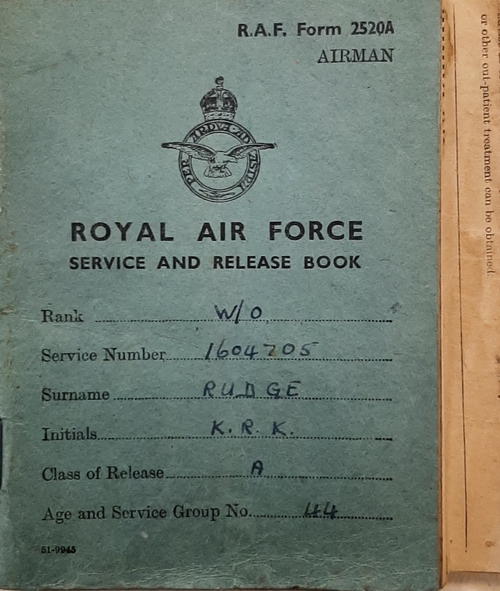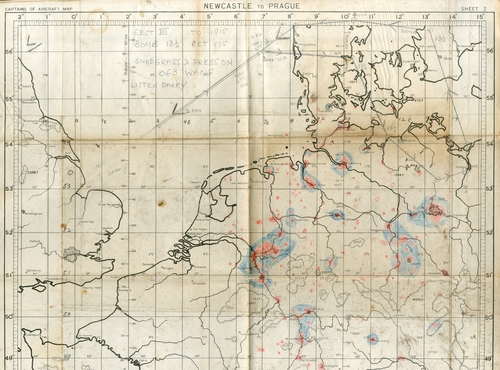Auction: 25003 - Orders, Decorations and Medals
Lot: 230
A notable Second World War D.F.M. group of five awarded to Warrant Officer K. R. K. Rudge, Royal Air Force, who completed 32 sorties as a bomb aimer in Lancasters of No. 101 Squadron, eight of them of a daytime nature and including the notorious Dresden 'firestorm' raid of February 1945
Singled out for use as a top-secret ABC 'Airborne Cigar' radio jamming unit, their Lancasters carried an eighth crew member, a fluent German speaker who used his ABC equipment to jam enemy airwaves: in turn, however, the enemy could likewise detect and track ABC, the resultant night fighter interceptions causing heavy losses
Distinguished Flying Medal, G.VI.R. (1604705 F./Sgt. K. R. K. Rudge, R.A.F.); 1939-45 Star; France and Germany Star; Defence and War Medals 1939-45, good very fine (5)
Provenance:
Spink Medal Circular, October 1995.
D.F.M. London Gazette 25 September 1945, the original recommendation states:
'Flight Sergeant Rudge has completed his first operational tour with this squadron. Many of the varied targets in Germany which he has attacked have been very heavily defended, but in spite of intense opposition this N.C.O. has never allowed it to deflect the accuracy of his bombing, which has always shown excellent results.
Flight Sergeant Rudge has always shown a great keenness for operations and his eagerness to strike the enemy in every way possible has been most apparent.
In a calm and unassuming manner this N.C.O. has completed his allotted task with a splendid courage and determination, and, as a result of his outstanding skill, splendid bombing results have been achieved by the crew of which he is a member.
By his complete devotion to duty and high order of personal courage, Flight Sergeant Rudge has always directed his captain with unerring skill and judgment, and it is recommended that his fine order of achievement be recognised with the award of the Distinguished Flying Medal.'
Keith Roger King Rudge was born in Clifton, Bristol on 19 November 1922 and was educated at Bristol Grammar School. A keen scout, he served as a messenger in the Civil Defence prior to joining the Royal Air Force in April 1942.
Having then undertaken aircrew training in Canada, he returned to the U.K. and qualified as an Air Bomber. And it was in that capacity that he joined No. 101 Squadron, a Lancaster unit based at Ludford Magna, Lincolnshire, in October 1944.
As Rudge would have quickly ascertained, the squadron's aircraft carried a top-secret innovation, namely ABC 'Airborne Cigar' jamming equipment. Manned by a Special Duty Operator (S.D.O.), who spoke fluent German - and who sat in a curtained-off area on the port side of the aircraft - the equipment enabled the operator to identify German radio frequencies and speech channels and then jam them.
Devised by the British Telecommunications Research Establishment at Malvern, in response to an urgent need to reduce the loss of Allied bombers to German night fighters - who were being guided on to our aircraft by their ground controllers - ABC could likewise be detected and tracked by the Germans, thereby making No. 101's Lancasters vulnerable to attack.
In fact, as it transpired, No. 101 suffered the heaviest squadron losses of the war, 145 of its Lancasters failing to return to base, with a death toll of 1,176 aircrew. Such emerging statistics would surely have been known to Rudge as he completed his 32-sortie tour of operations in the period October 1944 to April 1945.
That tour commenced with half a dozen sorties in November 1944, among them a brace of trips to both Dortmund and Wanne Eickel. And in December, he and his crew completed a further eight sorties, including strikes on Bonn, Karlsruhe and Koblenz. Poor weather having intervened in January 1945, the squadron flew just four sorties, including an attack on Munich, but more favourable conditions witnessed Rudge and his crew undertake another six sorties in February, among their targets being Dortmund, Duisburg and Dresden, the latter contributing to the city's notorious firestorms. And in March-April their targets included Chemnitz, Cologne, Hamburg and Mannheim.
Tour-expired, Rudge was awarded the D.F.M. and advanced to Warrant Officer, and he was demobilised at R.A.F. Swinderby in December 1946.
Sold with his original R.A.F. Service and Release Book, together with a Captain of Aircraft's 'Newcastle to Prague' flight map, annotated in pencil, three wartime photographs and two crew reunion images.
Subject to 20% VAT on Buyer’s Premium. For more information please view Terms and Conditions for Buyers.
Sold for
£2,900
Starting price
£800

